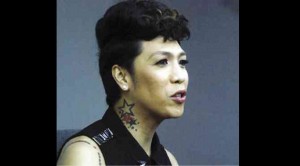There were many strange, weird and even bizarre portrayals on view last Holy Week, but the most cautionarily instructive and baffling of all was Vice Ganda’s depiction of a senior gay singer who made a name for himself on “Showtime’s” talent tilt for veteran performers, “Stars on 45.”
The senior talent’s life story was dramatized not because he was a particularly excellent performer, but because his experiences as a child and adult were more melodramatic than most.
As his unappreciative family’s breadwinner, workhorse and slave, the singer-beautician was a veritable “Beki Dolorosa,” and Vice took full advantage of the many emotional moments his character was given.
Our beef with Vice’s performance is not about his excessive emotionalizing, which was par for the course for “Lenten drama specials” of this soggy sort. What we found most confounding was the fact that Vice was playing a real person, but no effort was exerted to make him physically credible for the role.
In our view, this particular case of miscasting can teach all of us lessons on what not to do in TV dramatics, when a well-known star is assigned to portray an actual person who looks very different from himself.
In most other TV cultures, actors are tapped to play people they resemble. This, after all, is what good casting is basically all about—to suit the actor to the character.
In the case of the “Showtime” drama special, the procedure was turned upside-down: Vice was a star, he needed to play a performer with a highly melodramatic life, this particular senior talent qualified, so go!
Resemblance
Trouble was, there was no physical resemblance at all, but that didn’t bother the people involved. As a result, the finished special was highly improbable and unconvincing, and genuine empathy and shared emotionalizing was impossible to achieve.
In a more logical paradigm, if big-star Vice had to be given a “challenging” role to “prove” that he was more than “just” a comedian and could really act, the show would have to work harder to look for a similarly “eventful” life story, but of a singer who looked more like the actor.
Well, that didn’t happen, which just goes to show how wrongheaded our dramatic preferences and priorities can be.
What was most ironic about the situation was the fact that US-based Bernardo Bernardo appears to have been in town when the drama was taped and played a supporting role in it. And, you know what? He looked a lot like the character Vice was playing!
In another TV clime, therefore, Bernardo would have been cast in the lead role, and he would have done a much better job, partly because the “physical believability” requirement was fulfilled.
But, of course that didn’t happen, because Vice is a bigger star and the star gets the lead role in these parts, so Vice had to be “it,” no matter how illogically so.
Can anything positive come out of this confounding mess? We can only hope that, being intelligent, Vice eventually saw for himself how wrongheaded the entire experience was, and how bad it was for him.
No way did he prove that he was “good at drama” because dramatics require believability and genuine empathy, above all else. If Vice did learn this lesson, wonderful—there’s hope for us all. If he hasn’t—oops!


